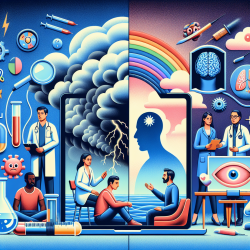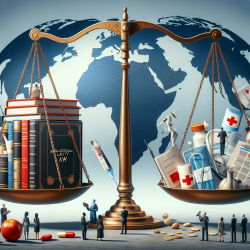Introduction
The intersection of legal frameworks and healthcare delivery is a complex yet essential aspect of achieving universal health coverage (UHC). The research article titled Right-to-Medicines Litigation and Universal Health Coverage provides valuable insights into how litigation can serve as a mechanism for accountability in health systems, particularly in Brazil. As practitioners in the field of online therapy services, understanding these dynamics can enhance your practice and advocacy efforts.
The Brazilian Context
Brazil's experience with right-to-health litigation, often referred to as the "judicialization of health," highlights the challenges and opportunities within a decentralized universal health system. The study reveals that the presence of a Public Defender’s Office significantly increases the likelihood of municipalities having medicine-requesting lawsuits. This finding underscores the role of legal institutions in mediating access to healthcare and ensuring accountability.
Implications for Practitioners
For practitioners, particularly those involved in providing online therapy services, the insights from this research can be instrumental in several ways:
- Advocacy for Legal Support: Understanding the role of legal institutions can empower practitioners to advocate for stronger legal support systems that ensure access to necessary medications and treatments.
- Community Engagement: Engaging with community-level determinants, such as socioeconomic development and the availability of legal services, can enhance the effectiveness of health interventions.
- Policy Development: Practitioners can contribute to policy discussions by highlighting the importance of integrating legal frameworks with health service delivery to address systemic inequities.
Encouraging Further Research
The study emphasizes the need for ongoing research into the community-level and institutional determinants of health litigation. Practitioners are encouraged to engage in or support research initiatives that explore these dynamics further. Such efforts can lead to more informed policy-making and improved health outcomes.
Conclusion
As the global health community continues to strive for universal health coverage, the lessons from Brazil's experience with right-to-medicines litigation offer valuable insights. By understanding and leveraging these insights, practitioners can enhance their skills, advocate for systemic improvements, and contribute to the realization of equitable healthcare for all.
To read the original research paper, please follow this link: Right-to-Medicines Litigation and Universal Health Coverage.










